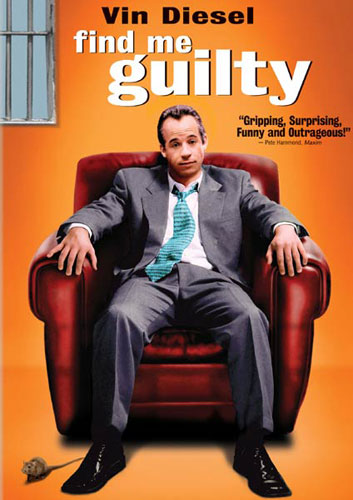Maybe I shouldn't expect too much from Vin Diesel. He has made his bones in Hollywood by being more movie star than actor. In the company of Alex Rocco, Peter Dinklage, Linus Roache, and the late Ron Silver, Diesel looks a little lost and overwhelmed at times. He isn't helped by the aging prosthetics and make-up which simply make him look formless and/or of indistinct age. But even with that being the case, Sidney Lumet's Find Me Guilty (2006) – his penultimate feature film – has a certain grace or charm that accommodates Diesel's limitations.
The script could have used some trimming as there are parts of the story that add nothing to the drama or understanding of the situation at hand. Lumet, though, accommodates this surplus material with consistent and nearly old-fashioned pacing that keeps the viewer involved in both the particulars and overall story all at once. The only real deficiency, and one I find is quite common to films, is that there is a difficulty in translating just how long a period of time is being depicted; the day count in the bottom corner of the screen was the only real indication of how lengthy the trial was supposed to be. On the other hand, some of the conceits – such as when Judge Feinstein (Silver) calls Jackie DiNorscio (Diesel) into chambers to inform him that his mother has died and offer sympathy (which makes a degree of sense since they had been judge and defendant/pro se lawyer for about a year at that point) – make a degree of thematic and emotional sense.
I am generally not a fan of films that glorify organized crime or demonize any government efforts to curtail it as being harsh and often borderline illegal. Find Me Guilty, however, plays more as the story of Jackie's somewhat naive belief that loyalty and love are the only factors he needs to guide him in life – the fact that his life is in a sorry state by the time he is standing trial is one with which he has to come to terms. Alex Rocco, on the other hand, gives an excellent performance as an out for himself Boss who cannot stand Jackie because he can only believe that Jackie is as duplicitous and self-serving as he is. He may have good reason to blame Jackie for the case the government brings, but his anger is more tied to Jackie's iconoclastic performance in court. He takes the cynical view that Jackie is only trying to win freedom for Jackie (and Jackie, by the way, is the only one in jail) and Rocco plays the ugly hatred as perfectly as I've seen in recent films.
Find Me Guilty isn't a brief movie, and it may not really have a lot to say. It is evocative of an older style of film making that tried to balance story and character instead of bravado and manufactured surprise to keep the viewer entertained. And, to some degree, I have to appreciate that Diesel was willing to challenge himself with a role well out of his comfort zone. That he doesn't quite nail it may ultimately weaken Find Me Guilty, but it doesn't keep it from being a well-made and worthwhile film.

No comments:
Post a Comment